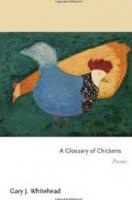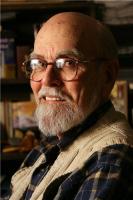March 12, 2013
Edited by David Sanders
Specimen Days
March 12, 2013
1209 – Djamal al-din Abu Mohammed Iljas Nizami, Persian poet, dies.
1808 – Gerrit van der Linde Jz, “Schoolmaster”, Dutch poet, is born.
1863 – Adolf A Wolfschoon, Curacao, poet, is born.
1912 – Irving Layton, Canadian poet (d. 2006), is born.
1952 – Naomi Shihab Nye, American poet, songwriter, and novelist, is born.
 Once my teacher set me on a high stool
Once my teacher set me on a high stool
for laughing. She thought the eyes
of my classmates would whittle me to size.
But they said otherwise.
We’d laugh too if we knew how.
I pinned my gaze out the window
on a ripe line of sky.
That’s where I was going.
—from “Fuel” by Naomi Shihab Nye
Poetry In The News
$100,000 Kingsley Tufts Poetry Award goes to Marianne Boruch

Claremont Graduate University announced Monday that the winner of its 2013 Kingsley Tufts Poetry Award is Marianne Boruch. Boruch will be awarded $100,000 for her collection The Book of Hours, published by Copper Canyon Press. The prize, one of the largest American awards for poetry, is given to a mid-career poet. Boruch's work includes two collections of poetry: Grace, Fallen From (Wesleyan, 2008) and Poems: New and Selected (Oberlin, 2004). Read more at Jacket Copy.
Unsanctioned Midnight Sidewalk Urban Poetry Howl
There are many forms of entertainment here in San Francisco. And those shows, those theaters sanctioned by officialdom, are not the end of the story. Much goes on here, in fact, below any level of official recognition. There are, of course, the above-ground entertainments which the city allows and endorses. Anything advertised on the scrolling signs at a B.A.R.T. station, well moneyed and non-controversial, is an example. Greater Tuna, that sort of thing. Or the apparently immortal, unkillable, Beach Blanket Babylon. Read more at Raw Story.
World Poetry
Tajik TV Channel Off Air After Dissident Poet Interview
The immensely popular Latvian poet and writer Imants Ziedonis died Wednesday evening at the age of 79, LETA learned from the Culture Ministry. According to LETA archives, Ziedonis was born in a fisherman's family in Riga District's Sloka County on May 3, 1933. The poet graduated from University of Latvia's History and Philology School in 1959 and the Higher Literary Courses in Moscow in 1964. Read more at Baltic Times.
New Books
Bone-Hollow, True: New and Selected Poems by Jack B. Bedell

[Paperback] Texas Review Press, 80 pp., $8.95
Jack B. Bedell’s poems celebrate the people, traditions, and landscapes that have shaped him throughout his life. The poetry collected in Bone-Hollow, True represents over two decades of Bedell’s published work, all driven by an intense love of story and heritage. From first page to last, this book revels in the culture that makes south Louisiana, and Bedell’s poetry, so unique.
Tongue Lyre by Tyler Mills
[Paperback] Southern Illinois University Press, 80 pp., $15.95
In Tongue Lyre, Tyler Mills weaves together fragments of myth and memory, summoning the works of Ovid, Homer, and James Joyce to spin a story of violence and the female body. Introducing the recurring lyre figure in the collection—a voice to counter the violence—is Ovid’s Philomena, who, while cruelly rendered speechless, nonetheless sets the reader on an eloquent voyage to discover the body through music, art, and language. Other legendary figures making appearances within—Telemachos, Nestor, Cyclops, Circe, and others—are held up as mirrors to reflect the human form as home.
The Bees: Poems by Carol Ann Duffy
[Hardcover] Faber & Faber, 96 pp., $23.00
The Bees is Carol Ann Duffy’s first collection of new poems as British poet laureate, and the much anticipated successor to the T. S. Eliot Prize-winning Rapture. After the intimate focus of the earlier book, The Bees finds Duffy using her full poetic range: there are drinking songs, love poems, poems to the weather, and poems of political anger. There are elegies, too, for beloved friends and—most movingly—for the poet’s mother. As Duffy’s voice rises in this collection, her music intensifies, and every poem patterns itself into song.
Recalculating by Charles Bernstein
[Hardcover] University of Chicago Press, 208 pp., $25.00
Long anticipated, Recalculating is Charles Bernstein’s first full-length collection of new poems in seven years. As a result of this lengthy time under construction, the scope, scale, and stylistic variation of the poems far surpasses Bernstein’s previous work. Together, the poems of Recalculating take readers on a journey through the history and poetics of the decades since the end of the Cold War as seen through the lens of social and personal turbulence and tragedy.
Glossary of Chickens: Poems by Gary J. Whitehead

[Paperback] Princeton University Press, 72 pp., $14.95
With skillful rhetoric and tempered lyricism, the poems in A Glossary of Chickens explore, in part, the struggle to understand the world through the symbolism of words. Like the hens of the title poem, Gary J. Whitehead's lyrics root around in the earth searching for sustenance, cluck rather than crow, and possess a humble majesty.
Recent Reviews
The Selected Letters of Anthony Hecht

by Patrick Kurp
On the spectrum of letter-writing readability, Anthony Hecht (1923-2004) combines elements of Keats and Moore. He is never less than charmingly fluent, even in the letters he writes home from summer camp as a boy. In 1935, age twelve, in the first letter included in Selected Letters, Hecht writes from Camp Kennebec in Maine: “Mike and Meyer [a comedy skit] went over with a bang and Alan acted as Mike. I am learning to swim and as I am a freshman the boys are pouncing on me. I wanted to tell you that it has been raining here for two days and it is necessary to wear boots.” Already we hear the gift for comic timing in the future author of “The Dover Bitch” and “The Ghost in the Martini.” Read more at Quarterly Conversation.
Correspondences
Interview with Miller Williams

by Jackson Meazle
Miller Williams, the Arkansas poet, is in fantastic but scant company. Arkansas is better known for its blues, country, and jazz artists. But almost anyone who reads Williams’s poems will realize that they can also be sung. Are song lyrics really poems set to music? Williams’s poems are poems, and the music comes through with reading, aloud or in one's head. I think I heard the music of Miller Williams’s poems before I had even known of his daughter, Lucinda Williams. When I did hear her music, I had a glimpse of where it might have come from. Miller's abilities also extend beyond the music of the English tongue, as he has published translations of several major voices of European and Latin American literature, lending his own dialect to the poems of Giuseppe Belli, Nicanor Parra, and Pablo Neruda. What I mean is that Miller's poems are like music. His manner of speaking is formal but rarely uptight. His fabric is cut from the everyday; it's the simple vision of life littered with pitches and notes. Read more at Oxford American.
Poet David Ferry on Writing Verse, Winning Awards at 88
Jeffrey Brown profiles David Ferry, a poet concerned with making connections to classical literature. Ferry was recently honored with the Ruth Lilly Poetry Prize as well as the National Book Award for poetry. At age 88, he is currently tackling a translation of Virgil's "Aeneid." Watch on YouTube.
Whispers of Love

by Brad Gooch
When Dick Davis, the preeminent translator of Persian poetry of our time, was a boy in Portsmouth, England, in the 1950s, he found on his parents’ bookshelf a copy of Edward FitzGerald’s swooning Victorian translations of The Rubáiyát of Omar Khayyám. Its presence was not so unusual, as those verses (“A Jug of Wine, a Loaf of Bread—and Thou”) had set off a minor craze. If an English middle-class family owned just three books, along with the Bible and Shakespeare would be FitzGerald. “It was a kind of universal badge of culture,” Davis jokes. Yet he absorbed so much of what he later described as “the candied death-wish of FitzGerald” that he knew most by heart. Instead of anxiety of influence, he experienced an opiated hit of influence. Read more at Newsweek.
Broadsides
Poesis Delanda Est!*
by David Biespiel
I’ve never much gone in for shoot ‘em up movies. I’ve never seen Terminator, other than the most famous clip (“I’ll be back”). I can’t stomach Quentin Tarantino movies or, his precursor, Sam Peckinpah. I went to see No Country for Old Men because my 17-year-old son kept taunting me that I couldn’t consider myself an educated person if I didn’t, and I was worried he might be right. I wanted to walk out in the first seven minutes. My wife and I did walk out of Slumdog Millionaire during the child acid-blinding scene. So you can imagine how queasy I’ve been as I’ve read Joshua Marie Wilkinson’s rant “On Poetry & Accessibility,” published recently in the journal Evening Will Come. In 5,000 words he ambushes, blasts, bombards, punches, stabs, strikes, and generally lays siege to a handful of poets and journalists, and when he’s not mugging them he’s abusing, censuring, maligning, and vilifying them. Read more at The Rumpus.
Insomnia and the Poet
by Lisa Russ Spaar
Insomnia is never far from my thoughts, especially when I am writing. A poor sleeper even as a girl, I spent many nights scribbling diary entries in a notebook on the bathroom floor after our crowded household had gone to bed. As an adult, with three spirited children and a full-time job, I often sought the desk in the wee hours by necessity. Those liminal hours between dark and dawn continue to haunt my praxis even now that my nest is empty. At night the smallest noises, including the surprising veracity of my own breathing, are more apparent and seem to command an acute attention. For me, there is nothing as inimitably private and attuned as nocturnal writing. Read more at the New York Times.
The Veil of Accessibility
Examining Poems by Frank O’Hara and Kenneth Koch in Light of Conrad’s Heart of Darkness
by C. Dale Young
The earliest memories I have involve reading. In fact, when I go back, when I return to the past, so much of what I can recollect in the farthest reaches are books and the experience of reading books. Sometimes the memories alone conjure up not just the act of reading and the works themselves but even the feel of the paper, the smell of the bindings, the dusty yellowed halo pulsing away as the book’s leaves are slammed shut. If part of being human is the act of telling and listening to stories, then what does one make of the act of reading, an act that is both story telling and listening? The brain must construct story even as the eyes capture the words the writer has left us. The human brain will construct story from almost anything. Painters have long been aware of this, the fact that if only a few icons or images are presented on a canvas the viewer will construct a narrative. Read more at American Poetry Review.
Why Rhyme Pleases
by Simon Jarvis
It does not please everyone. Even in the British eighteenth century, one of the times and places of its highest dominance, rhyme could appear to one critic an important component of ‘the source of the disorders of Great Britain’ (his choice of words). ‘A foolish admiration of this trifling and artificial ornament’, wrote Thomas Sheridan, ‘has turned people’s thoughts from the contemplation of the real and natural beauty of numbers. Like the Israelites, we have gone whoring after our own fancies, and worshipped this idol with so infatuated a zeal, that our language has in great measure fallen a sacrifice to it’. Sheridan’s view was not unusual. Edward Young deprecated thus Pope’s decision to translate Homer into rhyme. Read more at Thinking Verse.
Drafts & Fragments
Young Poets Society

by Meghan O'Rourke
Each year the Lilly Fellowships offer five young poets prestige, publicity, and—most elusive of all—money. The latest crop of winners represent how important, and how controversial, these awards have become. Read more at the New York Times Magazine.
Envoi: Editor’s Notes
In Praise of Concision
by Brad Leithauser
Some guy on TV is describing how he fitted his automobile with a new skin: gluing them one by one, he has blanketed every inch of its exterior with beer-bottle caps. Or he’s recounting how he fashioned, from zillions of ordinary toothpicks, a toothpick ten feet long and a foot thick—something Paul Bunyan couldn’t lift to his mouth. Or he’s displaying the dozens of photo albums that catalogue, exhaustively, the individual stacks of pancakes on which he has breakfasted daily for the past six years. And as I sit watching, one of my daughters ambles by, glances at the screen, and mutters, “Whoa, free time.” Read more at the New Yorker.
I enjoyed this article, but I take exception to his claim that Ogden Nash's "Fleas" is the shortest successful poem in any language. An old friend of mine, Ellen Gilchrist, once came up with one of the same syllabic length (which is what matters in poetry), but with a much more wistful and literary bent. The title was simply "Aubade." The poem in its entirety went: It's dawn. / Go on. The breadth of territory covered in those four syllables—the directness, the resignation, the authenticity of the utterance, and the captured essence of the aubade— is remarkable. Both are successful. Nash's verse is clever and funny, but Gilchrist's is so much more.
—David Sanders